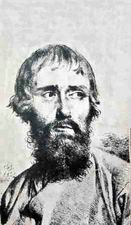Scatterheart
See just this Post & Comments / 1 Comments so far / Post a Comment / Home Who is the third who walks always beside you?
Who is the third who walks always beside you?When I count, there are only you and I together
But when I look ahead up the white road
There is always another one walking beside you
Gliding wrapt in a brown mantle, hooded
I do not know whether a man or a woman.
But who is that on the other side of you?
(FROM T.S. Eliot, The Waste Land)
 I have read Dostoyevsky's Idiot maybe a dozen times. Some say Prince Myshkin is Dostoyevsky's rendering of Christ. Could be. I cannot remember the exact details of the penultimate scenes in which he and Aglaya fail to come together but they are much of what bring me to the book again and again; a miasma of bourgeois fear and restraint, petty machinations of characters equally trapped, romantic tragedy - ai ai ai.
I have read Dostoyevsky's Idiot maybe a dozen times. Some say Prince Myshkin is Dostoyevsky's rendering of Christ. Could be. I cannot remember the exact details of the penultimate scenes in which he and Aglaya fail to come together but they are much of what bring me to the book again and again; a miasma of bourgeois fear and restraint, petty machinations of characters equally trapped, romantic tragedy - ai ai ai.Thinking of it this morning has brought me these thoughts:
 Why does Christianity (and why do Christians) fail to measure up? I trust that the failure is evident to all. You have only to pass a few hours at a few services and watch carefully to see it and know it beyond contradiction. The evidence is social because Christ's second great commandment was/is social - "love your neighbour as yourself" - and this is precisely where the failure occurs, because we simply do not.
Why does Christianity (and why do Christians) fail to measure up? I trust that the failure is evident to all. You have only to pass a few hours at a few services and watch carefully to see it and know it beyond contradiction. The evidence is social because Christ's second great commandment was/is social - "love your neighbour as yourself" - and this is precisely where the failure occurs, because we simply do not.Maybe it is just not possible. As a condition of existence, as a reality that comes to be in our hearts, love surely 'springs eternal'; but as a duty, as an obligation, as a standard, love either does not start, or starts and then withers. This is the reason (it seems to me) that charity often appears forced and false. John says: "The wind bloweth where it listeth, and thou hearest the sound thereof, but canst not tell whence it cometh, and whither it goeth: so is every one that is born of the Spirit." Like it or not, love is of both the spirit and the body. The Pope's recent letter seemed to be going in this direction as well. Eros, Filia, Agape, Caritas; none of these live only in the spirit. None of them fulfils Shakespeare's thought in Sonnet 116 that love "bears it out even to the edge of doom." Nor Paul's idea in his letter to the Corinthians that, "Love never dies."
That the world would change 'in a twinkling' as Revelations say it, if we could but carry out this commandment is obvious. This is the great attraction of Christianity; the immanent and potentially instantaneous and immediate transformation of everything we know into paradise by the simplest of actions. We are separated from paradise by the merest, tiniest, fraction of a millimetre, by the smallest portion of an instant; and yet it is never accomplished, never realized. No wonder that the moths surround the flame of Christ, hover at the doors of His churches, weep and pray to Him fervently and continuously.
I suspect that there is a similar attraction and failure in Islam and Juda.
At the end of his marvellous (and final) book, The Double Vision, Northrop Frye says: "Our life in the ressurection, then, is already here, and waiting to be recognized." The sentence before this one reads: "In the double vision of a spiritual and a physical world simultaneously present, every moment we have lived through we have also died out of into another order." The ressurection is there to be grasped, is not grasped, and dies.
 I trust you can see the symmetry of Frye's structure and mine.
I trust you can see the symmetry of Frye's structure and mine.Where does the energy go then? It goes to death. It misses the mark and straggles or staggers or dwindles off into sexual interest, into commercial success, bar talk, politics, whatever ... heat-death, what do they call it? ... Entropy. The physicists quibble over whether it tends to zero or infinity, but it is the same.
And the Prince? The Idiot? I thought he died in the end, but the text I find on the web tells me: "... Dr. Schneider frowns ever more and more and shakes his head; he hints that the brain is fatally injured; he does not as yet declare that his patient is incurable, but he allows himself to express the gravest fears."
There are some who fear hope I am told. You see this in Eliot, also in The Waste Land; it is cruel he says:
April is the cruellest month, breeding
Lilacs out of the dead land, mixing
Memory and desire, stirring
Dull roots with spring rain.
I am a dull old horse and tread the same circle again and again, too stupid to fear much except pain, back to my few landmarks, and usually ending here:
Be watchful, and strengthen the things which remain, that are ready to die:
He goes on to say something about perfection - well, who is perfect? And to my jaded faded sensibilities, even allowing that there are things which do remain is hope enough some times.
(the images were taken from: Penguin , Barnes & Noble, Blackstone, and Scatterheart Blog)
Down.




Caro David:
As fotografias a que se refere e que estão no meu blogue foram captadas nas imagens do sapo cujo link é o seguinte:
imagemdodia.no.sapo.pt
cumprimentos